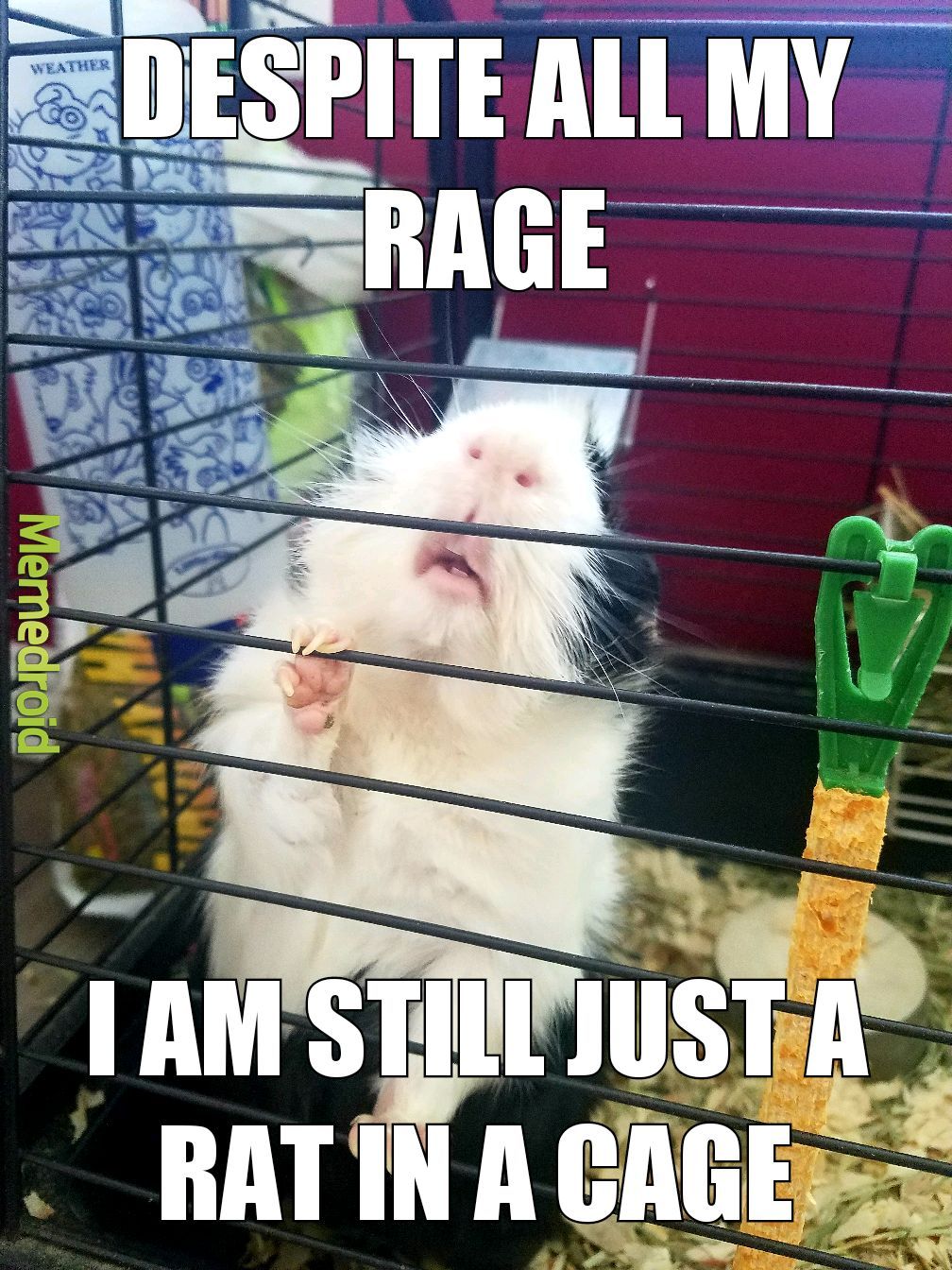Understanding The Metaphor And Its Implications
The phrase "just a rat in a cage" evokes a powerful image of entrapment and the struggle for freedom. This metaphor resonates deeply in various contexts, ranging from personal struggles to societal issues. In this article, we will delve into the origins of this phrase, its implications in literature and culture, and how it reflects the human condition. Our exploration will allow us to understand why this metaphor continues to be relevant in discussions about autonomy and confinement.
The concept of being "just a rat in a cage" can be traced back to the tumultuous feelings of frustration and helplessness that many individuals experience in modern society. Whether it’s in the context of a monotonous job, a stifling relationship, or societal expectations, the metaphor captures a universal sentiment of being trapped. In this article, we aim to dissect these feelings and explore the depths of this metaphor.
As we navigate through this discussion, we will not only analyze the origin of this phrase but also its representation in various cultural contexts, including literature, music, and psychology. Our goal is to provide a comprehensive understanding of how this metaphor reflects the complexities of life, and why it continues to resonate with so many people today.
Table of Contents
1. The Origin of the Metaphor
The phrase "just a rat in a cage" likely draws its origins from laboratory experiments where rats are placed in cages for research purposes. These experiments often highlight the themes of control and limitation. In a broader context, the metaphor symbolizes the constraints individuals face in their daily lives.
Understanding the Context
In various psychological studies, rats have been used to understand behavior under stress. The idea of confinement can represent societal limitations placed on individuals, making the metaphor particularly poignant.
2. Cultural Representations of the Cage
Culturally, the image of a rat in a cage has been utilized in various forms of art and media to convey feelings of entrapment. This representation can be seen in films, paintings, and performances that address topics such as freedom and restriction.
Artistic Interpretations
- Films often portray characters who feel trapped in their circumstances, paralleling the feelings of a rat in a cage.
- Visual arts sometimes depict cages as symbols of societal constraints.
- Performances frequently explore themes of confinement and the quest for liberation.
3. Psychological Perspectives on Confinement
From a psychological perspective, the metaphor of a rat in a cage can illustrate feelings of anxiety and depression. Individuals may feel as though they are unable to escape their situations, leading to a sense of hopelessness.
The Role of Environment
The environment plays a crucial role in shaping an individual’s mental state. Limited opportunities and oppressive surroundings can exacerbate feelings of being trapped. Understanding these dynamics can help in addressing mental health issues.
4. Literature and the Rat in a Cage
Literature has long explored themes of confinement. Various authors have used the metaphor of the rat in a cage to depict characters’ struggles against societal norms and personal limitations.
Notable Works
- George Orwell’s "Animal Farm" reflects the struggles of animals against oppressive forces, akin to being trapped.
- John Steinbeck’s "Of Mice and Men" captures the dreams and frustrations of characters confined by their circumstances.
5. The Music Connection
Music is another powerful medium that conveys the feelings associated with being "just a rat in a cage." Many songs capture the essence of frustration and the desire for freedom.
Influential Songs
- The iconic song "Cage" by the band "The Animals" captures the essence of feeling trapped.
- "Rats" by the band "The Rat Pack" explores the emotions tied to entrapment and escape.
6. Modern Interpretations of the Metaphor
In today's society, the metaphor of being "just a rat in a cage" continues to resonate. With the rise of social media and the pressures of modern life, individuals often feel confined by their circumstances.
The Impact of Social Media
Social media can amplify feelings of inadequacy and confinement, as individuals compare their lives to curated versions of reality. This new form of entrapment is a modern twist on the age-old metaphor.
7. The Fight for Freedom
Understanding the metaphor of being "just a rat in a cage" is crucial in recognizing the importance of the fight for freedom. Whether it be personal liberation or societal change, the desire to break free from constraints is universal.
Steps Towards Liberation
- Self-awareness: Acknowledging feelings of entrapment is the first step towards freedom.
- Seeking support: Engaging with others who share similar experiences can offer solace and solutions.
- Activism: Advocating for change on a societal level can help dismantle the cages that confine us.
8. Conclusion and Reflection
In conclusion, the metaphor of being "just a rat in a cage" is a powerful representation of the feelings of entrapment and the longing for freedom. It serves as a reminder of the struggles many face in their daily lives, from personal limitations to societal constraints. As we reflect on this metaphor, let us consider the steps we can take towards liberation, both for ourselves and for others.
We encourage you to share your thoughts and experiences in the comments below. If you found this article insightful, please consider sharing it with others or exploring more content on our site.
Thank you for reading, and we hope to see you back here for more engaging discussions!
Article Recommendations



ncG1vNJzZmilqZu8rbXAZ5qopV%2BZtq670mtmo62jqXqiedGaq2ahnmKubq%2FAoJxnoKSiuQ%3D%3D